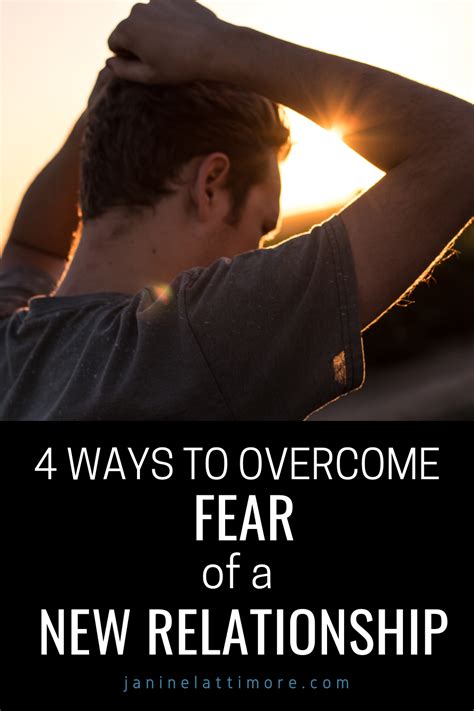In the realm of love, fear often lurks like a specter, casting its cold shadow over budding affections. The heart races, palms sweat, and a gnawing unease whispers doubts in our ears, making us question our readiness for a romantic journey. If you find yourself in this predicament, torn between the undeniable attraction you feel and the paralyzing fear that threatens to derail it, know that you are not alone. An estimated 15-20% of adults experience relationship anxiety, according to the American Psychological Association.

Understanding Relationship Anxiety
Relationship anxiety, also known as mate anxiety, stems from a complex interplay of factors. These include:
1. Past Relationship Trauma: Negative experiences in previous relationships can leave emotional scars that erode our trust and make us apprehensive about new romantic ventures.
2. Fear of Commitment: The prospect of committing to a long-term relationship can trigger anxiety in those who worry about losing their independence or facing the unknown.
3. Low Self-Esteem: Doubts about our self-worth can fuel fears that we are not good enough or that we will be rejected by the person we love.
4. Cognitive Distortions: Our thoughts can play a significant role in fueling relationship anxiety. Negative thoughts, such as catastrophizing or mind-reading, can amplify our fears and make them seem insurmountable.
Assessing Your Fears
Acknowledging and understanding your specific relationship fears is the first step towards overcoming them. Ask yourself:
- What exactly am I afraid of?
- Is my fear based on past experiences or present concerns?
- How does my fear impact my behavior and interactions?
By pinpointing the source of your anxiety, you can begin to develop strategies for addressing it.
Overcoming Relationship Anxiety
Conquering relationship anxiety requires a multifaceted approach that incorporates both practical strategies and cognitive shifts. Here are some effective steps:
1. Cognitive Restructuring: Challenge your negative thoughts and replace them with more positive and realistic ones. Focus on your strengths and the potential benefits of a relationship.
2. Gradual Exposure: Gradually expose yourself to the situations or triggers that evoke your anxiety. Start with small steps and work your way up to more challenging ones.
3. Mindfulness: Practice mindfulness techniques to calm your nervous system and reduce the intensity of your fears. Pay attention to your thoughts and feelings without judgment.
4. Communication: Talk to your partner openly about your fears. Express your concerns and work together to find solutions that alleviate your anxiety.
Benefits of Overcoming Relationship Anxiety
Embracing a relationship despite fear offers a multitude of benefits:
- Increased Intimacy: Open communication and vulnerability foster deeper emotional connections and intimacy.
- Improved Self-Esteem: Overcoming relationship anxiety builds your confidence and self-worth.
- Greater Happiness: Relationships are a significant source of joy and fulfillment in life.
- Personal Growth: Facing your fears challenges you to grow, learn, and develop emotionally.
Embracing the Journey
Remember, the path to overcoming relationship anxiety is not always easy. There may be setbacks along the way. However, by embracing the journey with courage and determination, you can break free from the shackles of fear and forge fulfilling, loving relationships.
Table 1: Common Relationship Fears and Their Causes
| Fear | Possible Causes |
|---|---|
| Fear of commitment | Fear of losing independence or facing the unknown |
| Fear of rejection | Low self-esteem or previous rejection experiences |
| Fear of intimacy | Past trauma or difficulty expressing vulnerability |
| Fear of conflict | Difficulty resolving conflicts or fear of abandonment |
| Fear of being controlled | Previous experiences with overbearing partners |
Table 2: Effective Strategies for Overcoming Relationship Anxiety
| Strategy | Description |
|---|---|
| Cognitive Restructuring | Challenging negative thoughts and replacing them with positive ones |
| Gradual Exposure | Gradually exposing yourself to anxiety-provoking situations |
| Mindfulness | Practicing techniques to calm the nervous system and reduce anxiety |
| Communication | Discussing fears with your partner and finding solutions together |
| Assertiveness | Expressing your needs and boundaries respectfully |
Table 3: Benefits of Overcoming Relationship Anxiety
| Benefit | Impact |
|---|---|
| Increased Intimacy | Deeper emotional connections and vulnerability |
| Improved Self-Esteem | Increased confidence and self-worth |
| Greater Happiness | Relationships as a significant source of joy and fulfillment |
| Personal Growth | Challenges to grow, learn, and develop emotionally |
Table 4: Tips for Embracing the Journey of Overcoming Relationship Anxiety
| Tip | How to Implement |
|---|---|
| Seek support | Talk to a therapist or counselor for guidance and support |
| Join support groups | Connect with others who share similar experiences |
| Practice self-compassion | Treat yourself with kindness and understanding |
| Celebrate small victories | Acknowledge your progress and reward yourself along the way |
| Focus on the present | Dwelling on the past or worrying about the future only intensifies anxiety |
